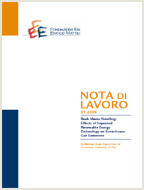Weather and Income: Lessons from the main European regions

Data
05.05.2015
05.05.2015
Autori
David García-León (Universidad de Alicante)
Codice JEL
O1, O4, Q51, Q54, Q59, R11
O1, O4, Q51, Q54, Q59, R11
Parole chiave:
Economic Growth, Weather, Ricardian Analysis, Developed Economies, Climate Change, Adaptation, NUTS
Economic Growth, Weather, Ricardian Analysis, Developed Economies, Climate Change, Adaptation, NUTS
Publisher
Climate Change and Sustainable Development
Climate Change and Sustainable Development
Editor
Carlo Carraro
Carlo Carraro
Some recent papers by Dell et al. (2009) and Dell et al. (2012) (DJO) relating weather and economic outcomes, have delivered meaningful messages with clear implications to the effects of a changing climate. In a nutshell, the authors claim that a 1°C increase in global average temperatures would harm both the level and growth capacities of relatively poor countries, leaving rich countries basically unaffected. In this study, we make use of a detailed weather and economic dataset covering the main regions of the five largest economies in the Euro area in an attempt to refute the previous affirmation. In particular, we find in our sample that global warming affects, although in a modest manner, all regions within well-developed countries in the long-term (level effect). As in DJO, the level effect in poor regions is exacerbated. The latter regions also suffer from a slight negative short-term effect (growth effect). We claim also that the larger short-time response of these regions to a climate shock is partially adapted in the long-run.
***
Suggested citation: García-León, D., (2015), ‘Weather and Income: Lessons from the Main European Regions’, Nota di Lavoro 39.2015, Milan, Italy: Fondazione Eni Enrico Mattei
